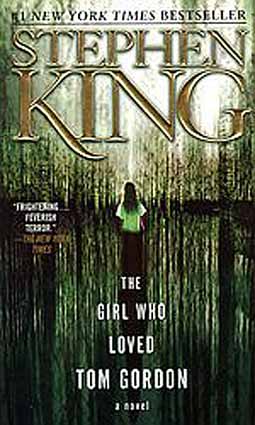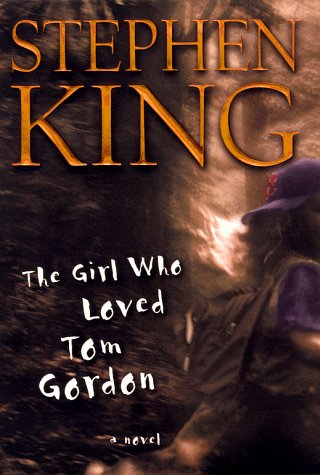
My first Stephen King novel: The Girl Who Loved Tom Gordon. I found it appropriate because it's the first one of his I've ever owned; now I have a massive collection that I have yet to work on. My parents let me pick out any book I wanted when I was in middle school, and for some reason I picked this one. It must have been a best-seller at the time (1998), but it's been on my shelf ever since then. Now, I finally made the time to read it.
King's work is known for being really bizarre and horrifying. I've seen many of the film adaptations of his books: The Stand, It, The Green Mile, Pet Semetary, The Shining, Carrie, Dreamcatcher, Hearts in Atlantis. Eventually, I will read some of these books, but their plots are extremely intense, in-depth, and scary (for a lack of a better word).
The Girl Who Loved Tom Gordon was a bit different from the movies I have seen of his. The book is really about one person, a nine-year-old girl who gets lost in the woods. She wanders off of the path and finds herself lost in the woods in New England. She needs to rely on her basic skills in order to survive--she rations her food, she needs to eventually find food so she will not starve (fish, fiddleheads, nuts berries), she finds shelter, she follows a river because she knows it will lead to people. It's not too bad for a nine year old.
You may not think that the plot sounds too scary. However, I bet if you were tossed in the middle of the woods for nine days as a nine year old, you might think otherwise. King adds some other elements to the story to make it a bit more chilling: an unknown beast stalks her in the woods (the God of the Lost), and they eventually come head to end at the end of the novel. She also hallucinates at times, sometimes even seeing or hearing things because she eventually is starving and comes down with pnemonia.
Throughout Trisha's struggles, she keeps hope and fatih because of one person: Tom Gordon, closing pitcher for the Boston Red Sox. The only sanity that Trisha can find is from Gordon and the Red Sox. She listens to their baseball games on her walkman, also hearing small news announcements about her disappearance. The games give her a touch of humanity, and she feels not as alone. She convinces herself that if Gordon saves games, she will in turn be saved herself. Later on, she eventually starts to see Gordon in the woods. He communicates with her, sort of keeping her sane and pushing her to move on.
Not only does she hallucinate in seeing Tom Gordon, but she also hallucinates when she sees three dark hooded figures in a clearing near the river. They warn her of the God of the Lost and give her other forewarnings. Trisha constantly feels like she's beeing followed, and she basically is. What she thinks is the God of the Lost is really a bear. Once she finally makes it to the road, the bear comes charging at her. She hallucinates again, thinking it is the God of the Lost, and believes it wants to kill her. She decides to do exactly as Tom Gordon does when he closes games: he shows the opponent who is boss and stands his ground. So, in turn, Trisha stands her ground but is saved right before the bear attacks her. A nearby hunter scares away the bear, and Trisha is brought to a nearby hospital.
Trisha is eventually met by her parents (who are divorced) and points up to the sky just like Tom Gordon does after he wins games. Trisha's parents' divorce is a common thread throughout the novel. Trisha struggles with moving, dealing her with brother's hostility against the separation, her isolation, and her father's drinking. It is because her mother is so absent-minded over Trisha because of the divorce and external pressures that she is lost in the first place. However, the act of her going missing brings her family closer together, almost mending something that was broken.

Alcoholism seems to be a constant thread also in King's books. I think of The Shining for instance and wonder if King weaves in his own issues into his books--and why not? It was sad to see a nine-year-old girl affected by her father's drunkenness; no nine year old needs that kind of bad role model.
Even though the plot may sound kind of dry--just a girl traveling through the woods alone--King spruces it up with flashbacks and small adventures and problems that arise along the way. It was a pretty fast read, and it's a smaller book of his.
Some of the images that King portrayed were so clear that I could visualize, taste, smell, hear, or feel what he was describing. For instance, when he described the mosquitos lingering and buzzing and biting and swarming, it made me shudder as if I was there. His descriptions were so accurate and dead-on. Even for using this girl as his protagonist--I thought he did a pretty good job of characterizing her thoughts, especially from being so opposite of himself.
My only criticism of the book is in Trisha's language. She has very sophisticated thoughts and begins to swear all the time. Now, one could make the argument that she grew up a lot during those nine days and went through some pretty terrible experiences that would make her become more like an adult and vent her rage and frustration through swearing. Point taken. However, I just think it was a bit much and made me question the validity of the narrator.
I did like a lot of its underlying themes though. I enjoyed seeing what happens to the person who is taken away from society and needs to fend for himself. What happens to the person who is isolated in the woods? It's like the recent post I wrote on Deliverance--so many movies and books have themes (and dark ones) about true human nature, and that is truly discovered when one is away from society, in the woods or deserted on an island. This book also touches on that same idea.
Trisha must rely on herself to survive. She has crazy thoughts that run through her mind, and she relives moments of her life. This experience puts her life in perspective too; what was really important? What would I not take for granted when I come back? These questions and overall ideas are pretty interesting, for we are not naturally or normally confronted by them since most of us live pretty simple and straight-forward lives.
I also loved this novel because it touches on so many late 1990s cultural concepts: Surge, the Red Sox, walkmen, "Tubthumping" by Chumba Wumba. I was a little older than Trisha at this age, but it was awesome to come across these cultural references.
Wikipedia said that in 2005, there were motions to make this into a film. Does anyone know if that is being carried out? That would be crazy...
I was also shocked beyond belief to find out that it was made into a children's pop out book. Woa! And it's been translated into many different languages. I didn't realize its popularity!
Last note from Wikipedia on the symbolism and concepts behind the God of the Lost/the bear: "The novel also features many classic mythological and cultural themes. The entity that stalks Trisha referred to in the novel as 'The God of the lost' is very similar to the wendigo a predatory demon from Native American mythology that was said to inhabit the forests of the northeastern United States and Canada, and was said to torment humans lost in the woods before eventually devouring them. Another theme common to Native American cultures as well as cultures around the world is the concept of the ordeal, a rite of passage in which a candidate must prove him or her self by braving a dangerous or daunting task or undertaking to be considered an adult." Ponder those ideas...
For my first King book, I enjoyed it. I can see his talent and his critical acclaim. He is definitely one of the best authors alive at this time, and he will be forever remembered for his crazy mind and depictions of the world around him. The way that he can churn out books makes me envious--what a talent he has. My god.
So, what do you think about The Girl Who Loved Tom Gordon?


1 comment:
other dolabuy hermes Clicking Here go to my site hop over to this web-site hop over to these guys
Post a Comment